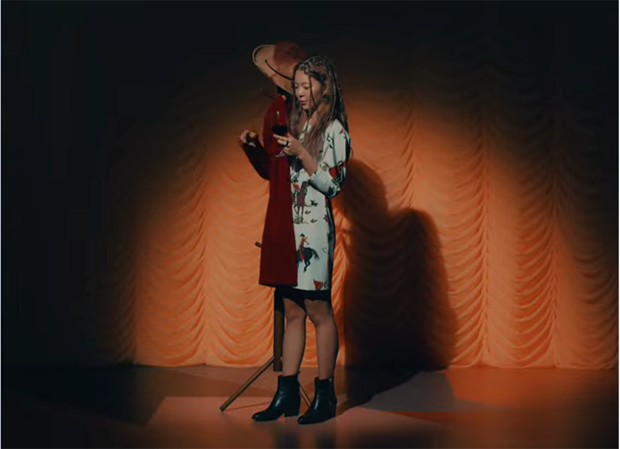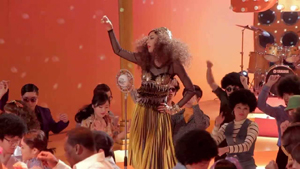 Music, film, and television star Park Ji-yoon is a respected artist in the industry. Her career spans over twenty years, and her catalogue is the perfect example of an artist who combines the delectable sweetness of pop and the edgier sensuality of R&B. Her voice is powerful, yet it has an understated grace that most artists today are hard-pressed to balance with their need to be the biggest and loudest. Her latest single, “Beep” is the epitome of that sophistication and dedication to creating music that’s both mature enough for an older audience and catchy enough to attract younger fans.
Music, film, and television star Park Ji-yoon is a respected artist in the industry. Her career spans over twenty years, and her catalogue is the perfect example of an artist who combines the delectable sweetness of pop and the edgier sensuality of R&B. Her voice is powerful, yet it has an understated grace that most artists today are hard-pressed to balance with their need to be the biggest and loudest. Her latest single, “Beep” is the epitome of that sophistication and dedication to creating music that’s both mature enough for an older audience and catchy enough to attract younger fans.
Borrowing heavily from 70s Funk and Disco from the States, “Beep” is a compositional treasure trove. The use of heavy drums is a perfect replication of the “boom-pow” of most Disco tracks. Layered atop that is the funky bottom line—usually achieved with a bass guitar, but in this case produced by a keyboard and synthesizer. The track is actually a great bit of fun musically. Lyrically, “Beep” isn’t anything that’s not already out there—a woman talking about the moment she saw the man who would be the love of her life, the man of her dreams, The One. But, as is the case for many “love at first sight romances,” once the honeymoon is over our heroine discovers her valiant knight in shining armor is not at all as perfect as he seems. In this way, the music and lyrics are perfect for each other. What do you do after you find out your prince is nothing more than a toad? Boogie down, of course! And “Beep” has enough boogie in it to be one of those tracks hot enough to break through the arctic chill of February.
[youtube http://youtu.be/9S0wPs6TrEE]All that being said, it’s quite fitting that Park Ji-yoon would choose a music video treatment that illustrates the funky hip-drop and sway of the music. After all, what good’s a dance song without a video to back it up? And the retro R&B diva delivers. She creates a video based on one of the most famous and iconic dance shows in history, Soul Train. Makes sense—Don Cornelius’s masterpiece of a show was one of the biggest supporters and proponents of the genres. The Soul Train Dancers welcomed Black audiences—and gradually audiences all over the world—with their latest moves, tricks, and grooves. The globe was wrapped up in Soul Train during its heyday in the 1970s and 1980s, and Black culture still feels the effects of the show nearly a decade after its final episode on March 25, 2006.
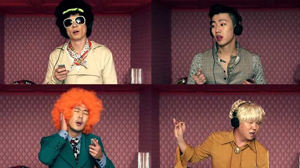 With a cast that includes Jay Park, Park Myung-soo, Haha, and Yoo Jae-suk, it’s a veritable who’s-who of Korean entertainers. So many cast members that KBS disqualified the video from its weekly evaluation because the credits were so long—taking up the last minute of the four-minute, seven-second video. All in all, it’s a rockin’ good time with Park Ji-yoon and friends and a cast of its own Soul Train Dancers to keep the party jumping. Director Zong Baik—who incidentally also directed Park Ji-yoon’s video for “Mr. Lee”—did an almost seamless job of blending in the original premise and dance sequences from multiple episodes of Soul Train back in the 70s and the modern-day dancers who participated in the video. The work can be applauded for how authentic it almost seemed. Almost.
With a cast that includes Jay Park, Park Myung-soo, Haha, and Yoo Jae-suk, it’s a veritable who’s-who of Korean entertainers. So many cast members that KBS disqualified the video from its weekly evaluation because the credits were so long—taking up the last minute of the four-minute, seven-second video. All in all, it’s a rockin’ good time with Park Ji-yoon and friends and a cast of its own Soul Train Dancers to keep the party jumping. Director Zong Baik—who incidentally also directed Park Ji-yoon’s video for “Mr. Lee”—did an almost seamless job of blending in the original premise and dance sequences from multiple episodes of Soul Train back in the 70s and the modern-day dancers who participated in the video. The work can be applauded for how authentic it almost seemed. Almost.
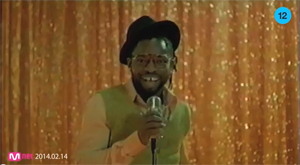 For those familiar with Soul Train, the opening sequence is enough to raise a few eyebrows. The MC—a Black man with buck-teeth, huge glasses, and rugged facial hair—is a shocking caricature of Black television show hosts. He’s loud, looks to be riding some sort of psychedelic high, and grunts and growls through poor English—not at all a problem, of course; the actor has lived in Korea for quite some time, so it’s not unexpected. None of that would actually be an issue if this video were simply trying to represent any dance show from the 70s. However, the creators of the video decided to use an actual show, and not just any show, an iconic piece of Black American history. Using this stand-in to represent Don Cornelius is a slap in the face for all those who grew up with the show—from the first dancer down the Soul Train Line in 1970 to the later permutations throughout the 1990s and early 2000s.
For those familiar with Soul Train, the opening sequence is enough to raise a few eyebrows. The MC—a Black man with buck-teeth, huge glasses, and rugged facial hair—is a shocking caricature of Black television show hosts. He’s loud, looks to be riding some sort of psychedelic high, and grunts and growls through poor English—not at all a problem, of course; the actor has lived in Korea for quite some time, so it’s not unexpected. None of that would actually be an issue if this video were simply trying to represent any dance show from the 70s. However, the creators of the video decided to use an actual show, and not just any show, an iconic piece of Black American history. Using this stand-in to represent Don Cornelius is a slap in the face for all those who grew up with the show—from the first dancer down the Soul Train Line in 1970 to the later permutations throughout the 1990s and early 2000s.
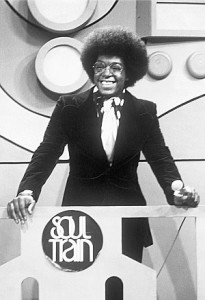 Don Cornelius is a hero of Black culture, a man who had little to his name and managed to become one of the first Black CEOs to own his own company, with his own brand and without the backing of White sponsors. He started out as a substitute radio DJ in Chicago, then went on to host a segment for WCIU called A Black’s View of the News. With $400 and a vision to bring young Black America face-to-face with some of the most popular Soul and R&B artists of the day, Cornelius presented the world to the first episode of Soul Train on August 17, 1970. With the help of George Johnson, founder of Johnson Products, the show picked up steam (forgive the pun) and became required watching for kids and families on Saturday mornings. Cornelius helped raise awareness about the importance of education in the Black community, about taking care of your health, mind and body. He shone a light on the continued efforts of the Black Panther movement of the 70s as well as showed young men and women who to define themselves as the kings and queens they are instead of settling for a stereotype forced upon them by mainstream society.
Don Cornelius is a hero of Black culture, a man who had little to his name and managed to become one of the first Black CEOs to own his own company, with his own brand and without the backing of White sponsors. He started out as a substitute radio DJ in Chicago, then went on to host a segment for WCIU called A Black’s View of the News. With $400 and a vision to bring young Black America face-to-face with some of the most popular Soul and R&B artists of the day, Cornelius presented the world to the first episode of Soul Train on August 17, 1970. With the help of George Johnson, founder of Johnson Products, the show picked up steam (forgive the pun) and became required watching for kids and families on Saturday mornings. Cornelius helped raise awareness about the importance of education in the Black community, about taking care of your health, mind and body. He shone a light on the continued efforts of the Black Panther movement of the 70s as well as showed young men and women who to define themselves as the kings and queens they are instead of settling for a stereotype forced upon them by mainstream society.
It’s that same stereotype we see plastered on the screen for the first thirty seconds of the video. For most, it seems an insignificant portion of the video. But for many people of color, it’s nothing more than an insult to a man who was not only a brilliant entrepreneur but also a sophisticated gentlemen, respected by his peers, musicians, and the leaders of the Black community. The man gesticulating and screeching at the MV’s opening is just another prick in the side of any Black fan of K-pop. That’s not to imply that K-pop artists are intentionally attempting to besmirch the image of Black people. However, little digs like this are hard to ignore and continue to raise the question—how ignorant can one be? If the creators of the MV had the presence of mind to attempt to weave in the original footage of the dancers with Park Ji-yoon’s dancers and castmates, why was it so difficult to use the same image of the man who created the show? Don Cornelius always preached “Love, Peace, and Soul.” He was a huge proponent of equality between all ethnicities. But he was also a man of great integrity and concern for his people.
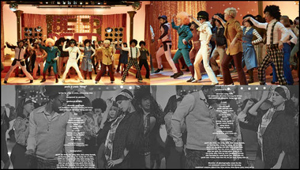 Of course, the point of “Beep”—any K-pop song for that matter—is entertainment. Certainly no one expects Park Ji-yoon to be an advocate for accurate Black representation in Korean culture or to stand up for Black rights or to actually make any statement at all in that regard. However, if the video is going to blatantly make use of such an important facet of Black American history, the creators or at least the artist singing the song should at least be expected to know a little bit about the images they intend to use. Casting an almost clownish example of Blackness as the host is one step shy of turning one of history’s most prominent entertainment programs into a minstrel show.
Of course, the point of “Beep”—any K-pop song for that matter—is entertainment. Certainly no one expects Park Ji-yoon to be an advocate for accurate Black representation in Korean culture or to stand up for Black rights or to actually make any statement at all in that regard. However, if the video is going to blatantly make use of such an important facet of Black American history, the creators or at least the artist singing the song should at least be expected to know a little bit about the images they intend to use. Casting an almost clownish example of Blackness as the host is one step shy of turning one of history’s most prominent entertainment programs into a minstrel show.
(YouTube[1][2], Officially KMusic [1][2], Essence, Mwave, Mystic89)


